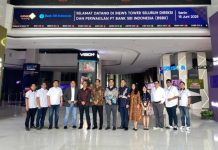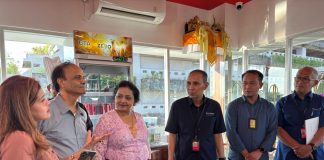by Amol Titus CEO of IndonesiaWISE, writer and lecturer interviews Amit Lohia: The ascendancy of emerging markets multinational groups is one of the exciting developments during the current phase of globalization.
One such group is Indorama which under the leadership of SP Lohia has become a force to reckon with in competitive sectors like Olefins, Polyester, PET, Spun Yarns, Textiles and others. Having successfully grown and expanded across difficult industry cycles the group has also proven its ability in successfully expanding overseas.
Today several of these initiatives are being spearheaded by Amit Lohia, a dynamic young entrepreneur who grew up in Jakarta and gained valuable practical experience at the company’s plants in Purwakarta and Bandung. He is currently based in Singapore.
He spoke to Amol Titus, CEO of leading strategic advisory firm IndonesiaWISE on the subject of entrepreneurship which is of interest to many young Indonesians who dream of one day emulating corporations like Indorama in their quest to achieve success in competitive international markets.
Question: You are a third generation entrepreneur after ML Lohia and SP Lohia. Can you share what valuable lessons on entrepreneurship you have learnt from both these distinguished individuals?
Answer: I never had a chance to work directly with my grandfather. He is a very humble man who as a trader started to travel the world at an early age, which was not easy or convenient in those days.
He endured his fair share of setbacks, such as losing all his business in Myanmar before embarking to establish a textile factory in Indonesia with my father S.P. Lohia who has been an exemplary role model.
In fact, Indorama’s culture and environment is heavily influenced by his personality; down-to-earth, humble, friendly, results-oriented, and great concern for others. Other lessons I’ve learned from him are perseverance, courage, being objective, and thinking big.
He has a fantastic effect on people. Those who work with him become high performers. He really challenges you and gets you to deliver.
He doesn’t micromanage and doesn’t come down hard on you when you make mistakes.
Entrepreneurship is about being a person whom others admire, an intuitive thinker, and a bold leader who never quits. I’ve learned all of this from my father.
The Indorama Group combines the strategy of organic growth with selective acquisitions. Can you share your vision on these two strategic choices?
It is true that Indorama has grown equally by a combination of new green-field projects and acquisitions.
Both have their pros and cons and we like to maximize our growth potential by embracing both approaches.
Green-field projects require excellent project management skills and availability of in-house experts from different disciplines, especially for engineering and construction.
Acquisitions is a quicker way to grow, but requires very fast decision-making skills and skills in specific areas such as legal due diligence, financial due diligence, etc., especially for cross-border transactions.
Finally, neither of these are possible to pursue without deep management broadband and excellent people.
From Indonesia Indorama has expanded into prospective emerging markets like Turkey, Nigeria, Uzbekistan and others. What lessons from your experience can you share with other budding entrepreneurs who wish to succeed in international markets?
Management bandwidth is crucial for successful growth, especially in international markets.
My experience is that one needs to send their best people for cross-border assignments, projects, or acquisitions.
I define “best” not in terms of technical skills alone, but also with regards to people skills and entrepreneurial spirit.
These ‘star performers’ have to uphold your organization’s image, be very results-oriented, and also know how to integrate different cultures with your organization’s own culture.
Courage and risk taking are critical attributes of an entrepreneur. Can you share your philosophy of risk taking?
Any human endeavor that is worth undertaking will be risky and filled with obstacles. By definition, entrepreneurs have to be risk-takers.
The outcome finally depends on a combination of factors such as strategic planning, execution, business analytics, risk management, perseverance, and luck.
Courage is equally important without which the obstacles which come along the way will quickly overcome you and make you give up too soon.
We all know that most successful entrepreneurs did not strike gold on their first attempt.
It is possible that you are being sent various proposals from investment bankers and business development staff that might contain over optimistic ‘Return on Investment’ scenarios. What is the process through which you evaluate to ensure investments do not get stuck due to over leverage, underestimation of risks or other such factors?
A. If one has a very deep, precise, and intuitive understanding of their business and industry, they can filter through subpar business proposals and optimistic business projections very quickly.
I really believe in the philosophy of “sticking to you knitting”. Indorama only invests in activities that are related to its core businesses or what it understands very well. I’m also a big believer in “back of the envelope” calculations. That’s a good test of really how well you understand your business.
What should entrepreneurs do within their industrial groups to create a sense of purpose, excitement and alignment around their vision among employees?
Communicating an aggressive but tangible goal is a great way to create excitement and alignment. It has to be bold but realistic and supported by a feasible plan. At the same time, it has to be simple and easy to remember.
Finally, there must be commitment and visible actions to progress towards the goal. Often communicated goals are pursued half-heartedly and lose fizzle.
Biodata
Name: Amit Lohia
Age: 37 years old
Marital status: married with two children
Education: Jakarta International School
Bachelors in Economics and Finance, Wharton
Interests: Spending quality time with family (wife and two kids), tennis, music (big fan of rock band U2) and education






